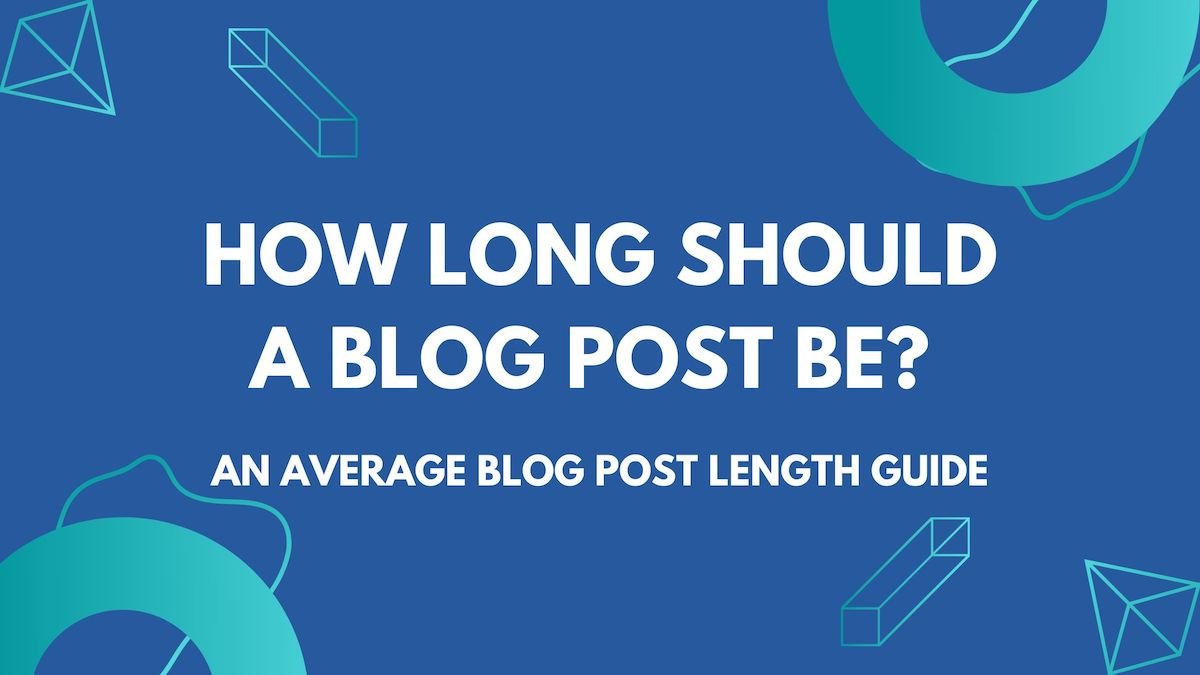How long should a blog post be is a common question. New bloggers, as well as experienced ones constantly ask about the perfect length of a blog post. For bloggers with a goal to optimize a blog’s length for its website audience as well as for search engines, can be a back and forth struggle. However, how many words a blog should be is not a cut and dry decision as quality will always trump quantity.
In this blog, we aim to answer the question of just ‘how long should a blog post be’!
How long should a blog post be?
For SEO, blog posts should be no less than 300 words. Longer blog posts, 1,000 words or more, tend to rank better than shorter blogs. However, blogs that have between 2,100 and 2,400 words rank the best on search engines.
These word lengths are considered to be average blog post length guides. However, there is some truth in the recommended lengths for optimized SEO blog posts. Whereas, leading digital marketing agencies have conducted research and pulled data from thousands of SERP results, showing that these recommended lengths are the best blog lengths for search engine optimization (SEO).
Are longer blogs better for SEO?
Yes, longer blogs typically perform better for SEO. Blogs with 2,100 to 2,400 words rank the best on search engines. Whereas, longer blogs allow for better and more in-depth content about a topic. Allowing for the blogger to include more relevant keywords and long-tail keywords.
Even though longer blog post perform better than short form content, this does not mean to add fluff to reach a certain word count. Content should always be written to serve to answer the searcher’s intent, and to provide valuable high-quality content. The content should never only be written to serve the needs of Google’s Algorithm.
To further our understanding of the optimal length of blog posts and website content for SEO, let us take a look at what top SEO agencies believe the average blog post length and what many digital marketers believe the ideal blog length for SEO should be.
SEO Agencies on: How long a blog post should be?
SEO industry leaders have all conducted blog post word count audits to investigate their best performing articles. In the table below you can see how long each company believes the ideal blog post length is, based on their unique blog post length data:
| SEO Agency | Minimum Blog Post Word Count | Optimal Blog Post Word Count |
|---|---|---|
| HubSpot | 333 | 2,100 – 2,400 |
| Databox | 600 | 1,500 – 2,000 |
| Wix | 600 | 2,450 |
| Hook Agency | 300 | 1,760 – 2,400 |
| Yoast | 300 | >1,000 |
| Buffer | 1600 | 2,500 |
| Semrush | 810 | 1,137 |
| Ahref | 300 | around 2,000 |
| Backlinko | N/A | 1,447 |
| Neil Patel | 500 | 2500-3000 |
How long should blog posts be by Industry?
How long a blog should be varies across industries as well. Neil Patel has put together data regarding the ideal blog post length and ideal word count for each industry to rank on the first page of Google search engine results pages (SERPs).
| Industry | Optimal Blog Post Word Count |
|---|---|
| Fashion | 800 – 950 |
| Film | 1,500 – 1,700 |
| Finance | 2,100 – 2,500 |
| Financial Technology | 2,000 – 2,150 |
| Food | 1,400 – 1,900 |
| Healthcare | 2,000 – 2,150 |
| Home and garden | 1,100 – 1,200 |
| Manufacturing | 1,700 – 1,900 |
| Marketing/advertising | 2,500 – 3,000 |
| Real estate | 1,800 – 1,900 |
| Recruiting | 900 – 1,000 |
| Retail | 1,500 – 1,700 |
| Sales | 2,500 – 2,700 |
| Tech | 800 – 1,000 |
| Travel | 1,500 – 1,850 |
How long blog posts should be by blog type
To dive even further into how long a blog post should be, this section will break down the optimal blog post length for different blog types provided by HubSpot. For the four main types of blog posts – Pillar Page, Listicle, ‘How to’, and ‘What is’ – the optimal length of each of them can be seen in the table below:
| Blog Post Type | Optimal Blog Post Word Count |
|---|---|
| Pillar Page | Around 4,000 |
| Listicle | 2,300 – 2,600 |
| ‘How-to’ | 1,700 – 2,100 |
| ‘What is’ | 1,300 – 1,700 |
General blog post word count and what they are for:
As discussed, the optimal length for a blog post is between 2,100 and 2,400. However, as you can see, there is no ‘one size fits all’ approach that will work in terms of ideal length. Therefore, this section aims to list out the different ranges of blog posts, and mention what their use is.
| Blog Post Length | Blog Post Use | Description |
|---|---|---|
| Less than 300 words | – Discussions, – Product Descriptions – Services Description | Blog posts of this length are extremely short and are usually not adequate for SEO as they tend to be considered ‘thin content’. |
| 300 – 600 words | Quick and bite sized information for readers with less time | This range of blog posts used to be the standard length in the past. However, now, they are considered as the bare minimum for content pieces. It tends to be difficult to demonstrate authority on a topic, as well as go into depth on the content at this lengthConsider these blog posts to be bite sized content that allows readers to get quick information on a specific topic. |
| 600 – 800 words | Journalism, news articles, definitions | These are beginning to be for educational purposes. They are becoming long enough to explain simple topics in their entirety. Additionally, these posts will begin to receive backlinks and social media shares |
| 1,300 – 1,700 words | ‘What is’ posts and promotional posts | This length of blog post is for educational purposes, and has enough words to get into more complex topics. Additionally, you will see more backlinks and social media shares, as well as organic traffic and conversions |
| 1,700 – 2,100 words | ‘How-to’ posts | This length will begin seeing better opportunities to increase website traffic, lead conversion and social media shares |
| 2,300 – 2,500 words | Listicle posts | This length of blog post is considered to be the optimal length for SEO and ranking on search engines. Moreover, bloggers typically cover a topic in its entirety with this blog length. It is usually in-depth, educational and provides complete information about the topic for its readers. |
| 4,000 words | Pillar Pages | This length of post is typically used for complete guides that cover everything about a topic. Whereas, the pillar page is all-encompassing with the blog post going into extreme detail in order to build authority. |
Average Blog Word Count Per SERP Position
The average blog length and the need for longer content also differs depending on the ranking position. Typically, the higher the ranking, the higher the average blog post length. For this study, Quick Sprout states that the top 10 results for 20,000 keywords were analyzed. The findings for average blog word count per SERP position are as follows:
| Google SERP Position | Average Blog Post Word Count |
|---|---|
| #1 | 2,416 |
| #2 | 2,494 |
| #3 | 2,492 |
| #4 | 2,341 |
| #5 | 2,327 |
| #6 | 2,223 |
| #7 | 2,127 |
| #8 | 2,138 |
| #9 | 2.087 |
| #10 | 2,032 |
Why how long a blog post is matters:
Long-form content, anything between 1,000 and 7,500, helps provide benefits to: the website’s audience; helps search engines decipher and understand the content; and, helps websites secure higher rankings, more social shares, and build backlinks. In other words, long form content is more engaging, more shareable, and better for SEO.
Let’s break down the benefits of long-form content to understand why how long a blog post is, matters.
Improved SEO performance and Ranking
As you have seen with the data listed above, the number of words a blog post has, has a correlated impact on its potential of ranking in the top 10 of search engine results. Whereas, in Quick Sprout’s study we can see that to rank in the top 10, you will need to write quality blog post content that ranges between 2,032 and 2,494 words.
The findings of that study are in line with what the ten SEO industry agencies stated as the optimal length of blog posts.
Six out of the ten SEO agencies stated that optimal content length should be around 2,000 to 2,500 words.
So how does blog post length correlate to SEO performance? Well, as you will see below, longer blog posts typically receive more of the positive signals that inform search engines that a piece of content is of high quality. These aspects include:
- Provide valuable and insightful content to your audience
- Longer blog posts can increase time spent on page
- Blog posts with more content receive more social media shares
- Long-form blog posts receive more backlinks
Let’s dive into each of these aspects a little more to see how they contribute to a better SEO performance.
Provide valuable and insightful content to your target audience
By writing a long form blog post you will be able to provide an ample amount of information to cover difficult topics thoroughly. Moreover, websites that focus on longer content have an easier time of showcasing their authority on a specific topic.
Building authority is an essential component of demonstrating to search engines, as well as website visitors, that the website is worth investing in. Whereas, blogs that have a longer average length are typically have an easier time covering the topic completely.
For example, when a website produces long, in-depth and insightful blog content that can thoroughly answer a visitor’s query, they will be able to find all their answers in one place. This will lower the website’s bounce rate, and send positive signals to search engines about the quality of the content. Moreover, it will build trust with the visitor, and prove that the website is an expert in its field.
Building on the positive signals being sent to search engines, blogs that are longer in length will also show search engine spiders that the website is building topical authority. While the spiders are crawling, indexing and ranking a website, they are building an understanding of the webpage which contributes to the final ranking position.
When a blog can build confidence both with its visitors, as well as with search engines, it will have a much easier time driving organic traffic as well as direct traffic to its website.
Longer blog posts can increase time spent on page
Blog posts that are long-form tend to be more engaging and result in visitors staying longer on webpages. Whereas, a study by Neil Patel, a digital marketing expert, shows that blog posts that are long in form, result in visitors staying on the content page 40% longer than shorter content. Additionally, longer blog post readers typically visited 25% more pages than other short-form blog post visitors.
How long a blog post is has another important impact on your website metrics beside increasing time spent on page, and more page page views. Whereas, a long blog post that is of high quality, also reduces the bounce rate of the blog post, as visitors are finding the content to be informative while also answering all their questions. Moreover, these aspects can also assist with the blog posts ability to increase its conversion rate as it is building trust with the visitor that the website can provide them with everything they are looking for.
Finally, to drive home why ‘how long a blog post should be’ in relation to ‘time on site’ is so important we can turn to Backlinko’s study which found that websites with a high “time on site” are more likely to rank highly on search engine results pages (SERPs).
Increased Social Media Shares
Blog posts that are longer in length perform better when it comes to social media shares. With social media shares being an important part of a website’s SEO performance.
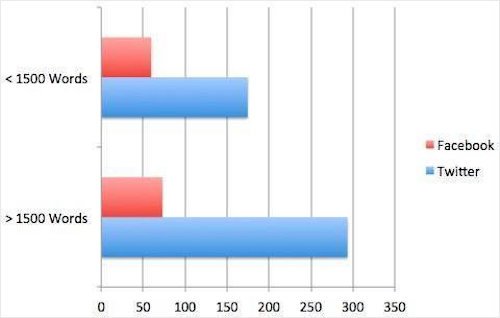
Regarding the length of blog posts and social media shares, Quick Sprout’s study found the following information and correlation between blog post word count and number of shares:
| Blog Post Word Count | Average Number of Shares on Twitter | Average Number of Shares on Facebook |
|---|---|---|
| Under 1,500 | 174 | 59 |
| Over 1,500 | 294 | 73 |
Additionally, the study found that blog posts with more than 1,500 words received 68% more tweets and 23% more Facebook likes than blog posts with less than 1,500 words.
Getting website visitors to share your blog posts can have huge impacts on a website’s SEO performance. Even though social media shares are not direct ranking factors, they will indirectly affect the website by generating social signals that tell you the content is useful.
Whereas, social media shares will help impact SEO in the following ways:
- Increased content distribution to new audiences
- Will increase the lifespan of blog posts
- Improve online visibility as well as referral traffic and organic traffic
- Better brand recognition within your industry
- Will boost local search engine optimization
A study by Cognitive SEO studied just how social media shares impact rankings of blog posts. Whereas they found a correlation between the number of social media signals (likes, comments and shares) and the ranking position. The findings can be seen in the image below:
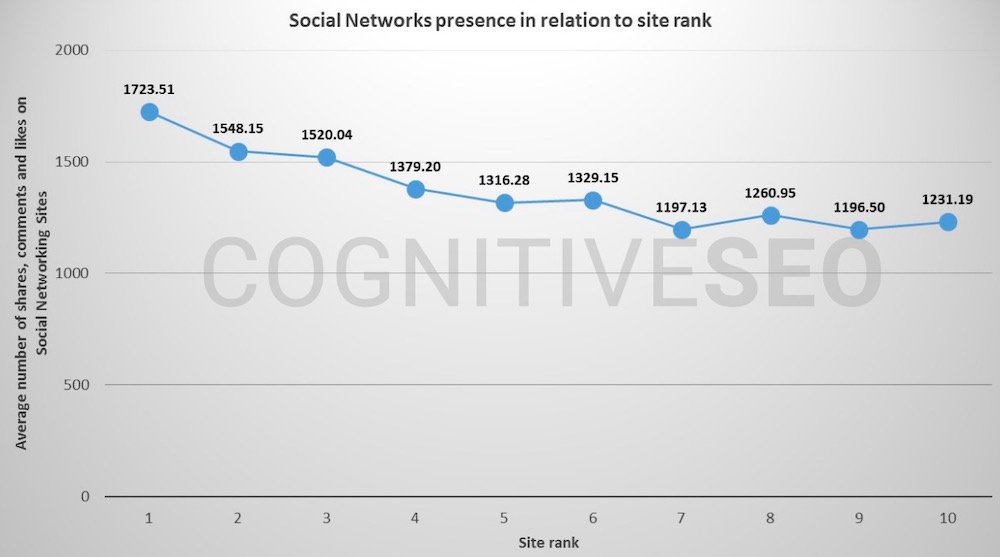
Long-form blog posts receive more backlinks
Like the number of social media shares, how long a blog post is has a positive correlation with how many backlinks it will receive. The longer a piece of content is, the better it will do with receiving backlinks and citations from third party websites.
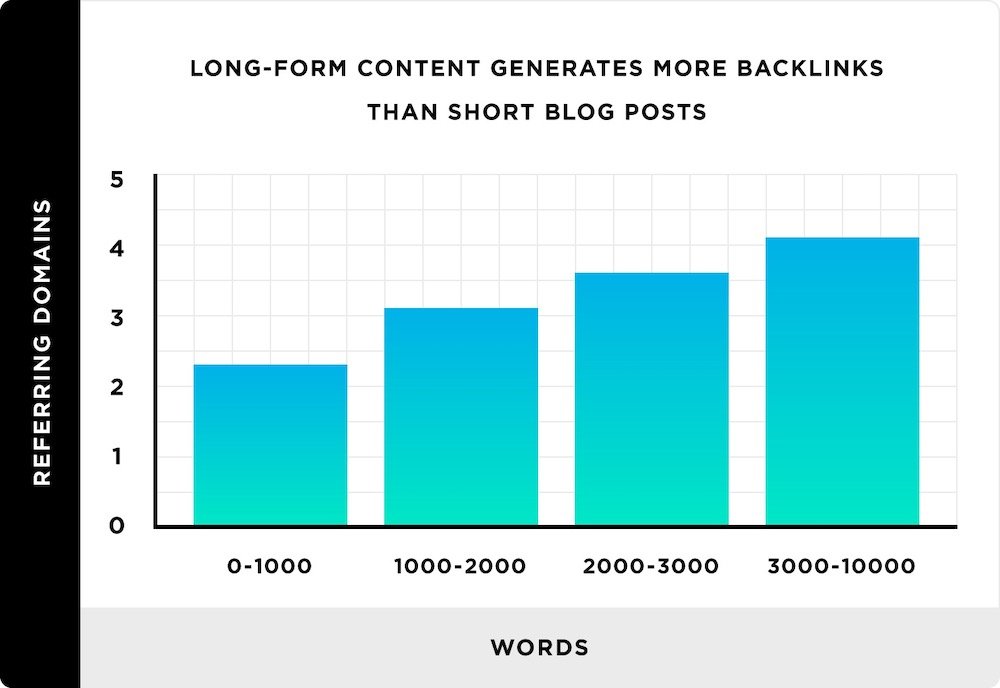
According to a Backlinko study, blog posts that are long-form, significantly outperform short-form blog posts. Whereas, blog posts that are longer than 3000 words get on average, 77.2% more referring domain links than content shorter than 1000 words.
In the table below, we showcase the relation between blog post word count and the number of referring domains.
| Blog Post Word Count | Average Number of Referring Domains |
|---|---|
| 0 – 1,000 | 2.4 |
| 1,000 – 2,000 | 3.1 |
| 2,000 – 3,000 | 3.6 |
| 3,000 – 10,000 | 4.1 |
HubSpot also conducted a study to understand the correlation between how long a blog post should be and the number of backlinks it receives. Whereas, in line with what Backlinko saw, HubSpot saw that there is a positive correlation between long-form blog posts and the number of backlinks.
More specifically HubSpot saw that blog posts with a word count over 2,500 earned the most links. The image below showcases the complete findings of a blog post word count and the number of linking domains.
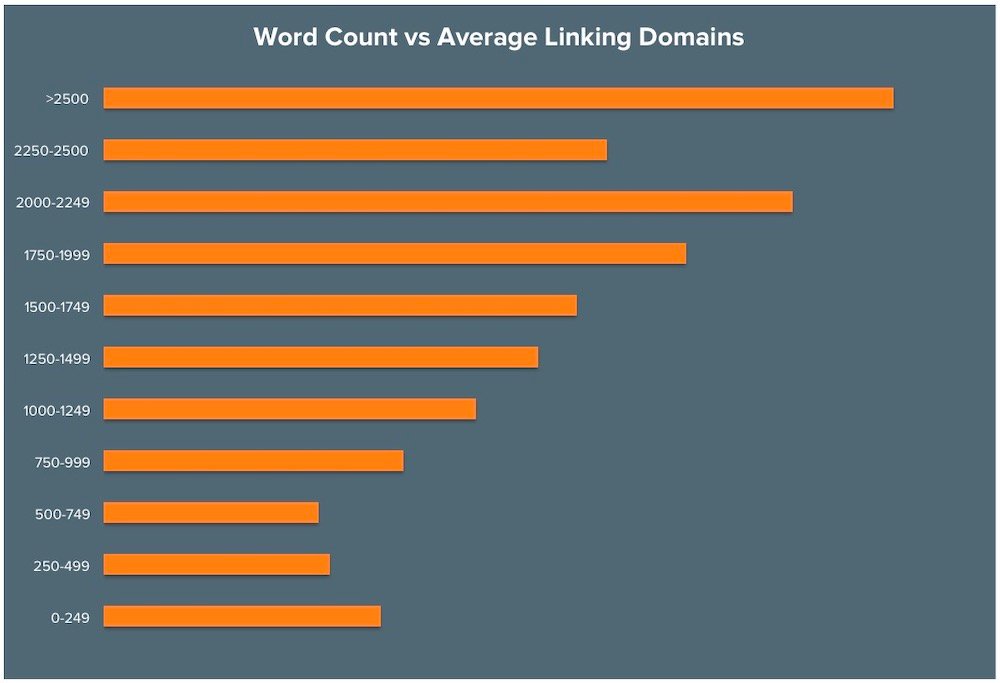
What does Google say about blog post length
Data shows that there is a correlation between how long a blog post is and Google’ search engine result rankings. However, what is Google saying about word count?
Google consistently states that blog posts and content length is not a ranking factor. Martin Splitt from Google stated that it doesn’t matter how long the content is, as long as it satisfies the users intent. For example, if the user’s search query requires a short, quick answer, then the content should be that long. Not stretched out just to meet a specific word count.
Moreover, Martin goes on to state that Google does not count the number of words on a specific page to rank the blog post. In other words, just because a page has double the number of words compared to another blog, doesn’t mean it will automatically rank better.
John Mueller from Google, echoes what Martin had to say. Whereas, Mueller had this to say,
“Word count is not indicative of quality. Some pages have a lot of words that say nothing. Some pages have very few words that are very important & relevant to queries. You know your content best (hopefully) and can decide whether it needs the details.”
Although Google puts an emphasis on quality over quantity, it doesn’t mean you should be setting out to write content that is thin. Thin content can end up damaging a website’s reputation with its audience as well as with Google.
Google may not consider how long a blog post is to be important, but it does consider the depth, robustness and informative state of the content to be the most essential component. In other words, this means that it is imperative that the blog post answers the search query completely.
FAQs: How long should blog posts be
Below are some of the most frequently asked questions regarding the ideal length of blog posts.
A blog length should normally be about 1,500 to 2,000 words. However, it may change depending on your topic and audience. When it comes to ranking on SERPs, longer posts seem to perform better. According to research, content ranked in the top 10 has a tendency to be more than 2,000 words long.
It is important to remember that as a writer you don’t want to sacrifice the reader’s experience for the sake of producing long-form content for search engines. Whereas, longer content is not always necessary for many types of blogs to provide value to users. For example, a recipe website will only need a few hundred words to satisfy the search query needs.
It’s also worth noting that the popularity of Google featured snippets might affect the length of the desired blog post. Whereas, featured snippets and target answers are only small snippets of information that answer the question in a concise and direct manner.
Generally speaking, longer blog posts tend to be better for SEO. Typically, for SEO purposes it is best to aim for about 1,500 words. However, best practices state that you should write as many words as it takes to completely cover a topic.
However, the best length of content typically depends on a number of factors, including the content of the post, the target audience for the blog, and the length of competitors blogs on the same topic.
This will ensure that you’re providing valuable information while still being easy enough for readers to digest. Additionally, it’s always a good idea to include images and videos if they help explain your points in a more easily understood way.
Some reasons why longer posts are more likely to rank higher in search engine results include:
- They’re easier to find. Longer articles tend to be indexed better by search engines because they’re more likely to be cited by other websites
- They’re more likely to be shared. When people share long posts, they’re usually doing it because they think that it will help promote the content further. This increased exposure leads to increased traffic and potential conversion rates
- They’re less likely to be buried under a deluge of links from low-quality sources. Longer articles are less likely to get drowned out by links from low-quality websites or blogs which is why they tend to rank better in SERPs.
Word count is not a ranking factor in Google’s search algorithm, according to John Mueller Google’s Search Advocate. He says specifically that “just blindly adding text to a page doesn’t make it better.” Rather than looking at the number of words on a page, Google’s algorithms look for relevant, original, and high-quality content.
That being said, word count does contribute to SEO in the form of a website being able to effectively cover a specific topic in its entirety. Whereas, some topics demand a longer form of content to ensure that the particular question is being answered, and providing enough information to the reader.
For example, let’s take two different questions, and think about the length of content needed to answer the question.
Question 1: How many days are in a year?
The answer to this is short and sweet – 365 days. It doesn’t take many words to get the answer out. Of course you will add some supporting information about the number of months and weeks in a year, but overall it will be a simple and short blog post.
However, if we look at question 2.
Question 2: What is the Oregon trail?
To answer this question it would take significantly more words to be able to properly answer the query.
In this regard, in order to get the maximum SEO benefit out of word count, you need to understand your target query. Moreover, make sure to include all of the relevant subtopics needed to provide enough information to your reader and search engine crawlers to leave them feeling satisfied about the information provided in the article.
In general, 500 words would be the minimum when it comes to blog length. 500 words should be long enough to provide ample information to cover the topic in its entirety.
However, shorter blog posts can be more difficult to rank well on search engines. This is because the content may come off as being thin and not providing enough depth to the conversion.
Therefore, in order to make sure that your post is well-written and informative, make sure that you focus on using active and engaging language. Also, make sure that you use strong verbs and adjectives to capture your reader’s attention and convey your message effectively. Finally, don’t forget to include references and sources so that your readers can explore further if they have any questions about what you’ve written.
800 words is good for a blog. It is longer than the bare minimum length of 300 words. Additionally, it is longer than the SEO recommended length of 700 words. In 800 words a writer can effectively cover a single topic and make it extensive enough to provide value to the reader.
It is important to note that 800 words is only long enough to cover a single topic. A blog that is 800 words in length will have a difficult time providing enough information to cover multiple topics, and will end up being thin content. Thin content will end up hurting a writer’s SEO efforts, and will make it extremely difficult to rank for any keywords.
Blogs with at least 1,000 words significantly increase the page’s ability to appear in search results. Experts believe that anything longer than 800 words is optimal for SEO.
A blog that reaches at least 100 words is getting close to the optimal length for many topics. Whereas, it will allow the writer to cover multiple related subtopics in a single article. By covering multiple subtopics, a blog will be more in depth and informative than a shorter blog.
For SEO purposes, blogs should be at least 300 words. However, this is considered extremely thin and most experts state Longer blog posts, 1,000 words or more, typically rank better than shorter blogs. However, blogs that have between 2,100 and 2,400 words rank the best on search engines.
When deciding how long should a blog post be in length, there are two different approaches to decide. One, is to write a post until you feel you have satisfactorily covered the entire topic and that your article provides enough information.
The second way to decide the length of your blog is by conducting a competitor analysis to observe the average length of blogs that are ranking for your target keyword. This will give you an idea of what the ideal blog post length is for that particular topic.
Key takeaways: How long should blog post be
Data shows that SEO performance, ranking position, number of backlinks and social media shares all are correlated with how long a blog post should be. The data matches with what SEO agencies believe to be the optimal length for ranking well on search engines. Whereas, they believe the optimal length for a blog post should be between 2,100 and 2,400.
Length of a blog post does matter. However, it is not the only thing that will get a blog post to rank well, or, impress your audience.
Quality is also an important factor in a blog post doing well. Quality should never be sacrificed to increase the length of a piece of content. Adding fluff, or off topic information, will only distract the audience as well as search engines.
Focus on developing content that answers search intent for the particular query and write whatever length required to answer the question in its entirety.
Writing blog posts that are of high-quality, as well as provide a thorough answer can be difficult. We at Clear Door SEO, an SEO company in Portland Oregon have an experienced content writing team that provides content writing services that perform well in Google search results. Contact us now to find out more about how we conduct keyword research, produce quality content, help you rank and drive organic traffic to your website!
